Barnes & Conti Newsletter: July 2003
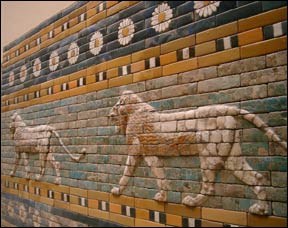 The
Architecture of Leadership
The
Architecture of Leadership
Last month, I had the opportunity to travel to Hamburg to deliver a program on inspirational leadership for a group of European Medical Directors from Eli Lilly. I decided to add a few days of vacation to leverage the jet lag (well, that was a good rationale) and so began my trip in Berlin, where I had never been before. It seems that everything I did and saw in Berlin related to issues and ideas regarding leadership—leadership that inspires greatness and leadership that creates devastation. Berlin itself is a city in the midst of tremendous change; cranes are everywhere, there is stunning new architecture, beautiful restored buildings from the past and archeological treasures, as well as ugly relics of the bad old days of the Third Reich and reminders of the divided city.
Three places especially stood out for me. In the Pergamon Museum, on the Museum Island of what was once East Berlin, sits the Ishtar Gate, part of Nebuchadnezzar’s Babylon. Striding lions of glazed brick—symbols of power—once decorated the Processional Way from the gate to a special festival house north of the city. Nebuchadnezzar was quoted as having said, “Is this not Babylon the great, which I myself have built as a royal residence by the might of my power and for the glory of my majesty?” Since those ancient days, countless leaders have come and gone—along with their power and glory—in what is now modern Iraq. The enormous gate—as well as the place it came from—reminds me that leaders have been known to take themselves too seriously.
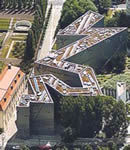 The
second symbol of leadership is the new Jewish Museum, designed by the talented
architect, Daniel Libeskind. (For those of you familiar with
Judeo-Christian history, there is a theme in the name Daniel.) His zigzag,
broken Star of David design both celebrates and mourns the experience of Jews
in Germany. It provides a moving (both literally and figuratively) sense of
exile and yet of hope. Even the darkest moments of history can inspire leadership,
learning, and artistry.
The
second symbol of leadership is the new Jewish Museum, designed by the talented
architect, Daniel Libeskind. (For those of you familiar with
Judeo-Christian history, there is a theme in the name Daniel.) His zigzag,
broken Star of David design both celebrates and mourns the experience of Jews
in Germany. It provides a moving (both literally and figuratively) sense of
exile and yet of hope. Even the darkest moments of history can inspire leadership,
learning, and artistry.
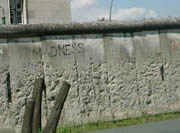 The third symbol is the remnant of the Berlin Wall. Intended
to divide, to close in, to keep people apart, the wall is now maintained as
a museum and tourist destination. Checkpoint Charlie—for nearly thirty years
one of the only crossing points from West to East Berlin—is located near
a busy intersection where cafes, shops, flea markets, and businesses thrive
on
either side of the carefully replaced sign saying, “You are now entering
the American Zone.” My leadership lesson here is that we inspire others through
example rather than through restriction.
The third symbol is the remnant of the Berlin Wall. Intended
to divide, to close in, to keep people apart, the wall is now maintained as
a museum and tourist destination. Checkpoint Charlie—for nearly thirty years
one of the only crossing points from West to East Berlin—is located near
a busy intersection where cafes, shops, flea markets, and businesses thrive
on
either side of the carefully replaced sign saying, “You are now entering
the American Zone.” My leadership lesson here is that we inspire others through
example rather than through restriction.
Leadership is a hot topic in these days of corporate ethics crises, budget and recall battles in the states, blame fixing and backside-coverage by many who should, instead, be stepping forward and inspiring others to confront problems and create innovative solutions. As leaders, I hope that all of us can do so with humor, hope, and courage.
—Kim
Photographs, from top to bottom:
Processional Way from the Ishtar Gate (detail)
Aerial view of the jewish Museum, Berlin
A section of the Berlin Wall
In this Issue:
- “Performance Coaching: How Leaders Create High Performing Organizations” by B. Kim Barnes
- What’s New at Barnes & Conti
- New Programs: Stone Soup Leadership & Facilitating Forward
- Newly Revised Program: COACH for Peak Performance
- Barnes & Conti at ASTD
- Recommended Reading: Organisational Learning for all Seasons
- Recipes:
- Corn, Tomato, and Feta Salad
- Soupe au Pistou—Summer Vegetable Soup with Pesto
- Just for Fun
Performance Coaching: How Leaders Create High Performing Organizations
B. Kim Barnes
Performance coaching is an idea whose time has arrived—but it is not for everyone. Believing in this approach means believing that people want to succeed, that they want to give their best and do meaningful work that makes a real difference. Coaching for peak performance is not about focusing on the few “stars” that rise in every organization, nor is it about fixing something that is broken. It is about providing support for everyone in the organization who believes in its mission and vision to perform to the best of their ability. It is about creating a culture where learning and coaching are valued and expected aspects of organizational life; where having a coach and being a coach are normal for everyone from the CEO to the newest assistant associate in the company.
Performance coaching is the process of choice under the following conditions:
You agree that:
- Most people, if given the choice, would rather succeed than fail
- People learn best what they need to use soon and that which will make them more likely to succeed
- Performance pressure (needing to deliver on a commitment) increases the extrinsic motivation to learn and improve skills
To read the entire article, click here.
What’s New at Barnes & Conti?
New Programs: Stone Soup Leadership & Facilitating Forward
Both our new programs focus on leadership. Stone Soup Leadership is about how to inspire your team members; Facilitating Forward is a how-to-get-things-done program for project managers. 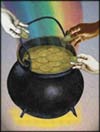 Stone Soup Leadership
Stone Soup Leadership
Using the “stone soup” metaphor from folk literature, this powerful, experiential program provides participants with the insights and skills to inspire team members to believe in the extraordinary work they can do together if everyone contributes and builds the vision of success together. Participants will learn and practice key skills for inspiring others and then select a project and form action-learning teams to apply what they have learned in a way that helps create an inspiring culture within their organization.
For more information about Stone Soup Leadership, click here.
 Facilitating Forward for Project Managers
Facilitating Forward for Project Managers
Facilitating Forward for Project Managers is a new skill-development program for project managers who need to facilitate meetings of their team and other groups of people in order to achieve buy-in and accomplish results. In this highly experiential program, they will learn the fundamentals of facilitation including observation, communication, and intervention. They will gain insights, tools and techniques, and learn how and when to move between the roles of leader and facilitator.
For more information about Facilitating Forward, click here.
We’re happy to announce that both new programs will be offered to the public in the San Francisco Bay Area this fall. Please see our public program schedule for details.
 News Flash! COACH for Peak Performance
News Flash! COACH for Peak Performance
As of this writing, COACH for Peak Performance has just been revised and updated. For more information about performance coaching, please read Kim’s article on performance coaching (above).
For more information about the program, click here.
Barnes & Conti at ASTD
We had a successful and fun time at ASTD in San Diego this past May. Our thanks to all the old and new friends who stopped by our booth. Two highlights were the seminar that Kim Barnes and Janne Rochlin gave, entitled, “A Prescription for Change: Facilitating Risk-Taking in a Pharmaceutical Environment” and the cocktail party to celebrate the launch of our new Stone Soup Leadership program.  Kim
Barnes’ Article in New Book: Organisational Learning
for all Seasons
Kim
Barnes’ Article in New Book: Organisational Learning
for all Seasons
Kim says, “The book was edited by my friend and colleague, Prem Kumar, in Singapore and contains excellent articles from contributors like Daniel Goleman, Robert Fritz, Marvin Weisbord, and Sandra Janoff. It is a very good compendium of resources for anyone interested in OD.” Kim’s contribution is entitled, “Intelligent Risk-Taking: Using Experiential Training as a Change Intervention.”
Upcoming Public Programs
Exercising Influence
July 23-24, 2003, Milpitas, CA
September 18-19, 2003, 2003, San Francisco, CA
Stone Soup Leadership (new program)
September 3-4, 2003, San Francisco, CA
Facilitating Forward (new program)
November 4-5, Milpitas, CA
Constructive Negotiation
August 12-13, 2003, San Francisco, CA
Intelligent Risk-Taking
September 9-10, 2003, Milpitas, CA
To register
for one of our public programs, click here
or go to: www.barnesconti.com/ppsched.php
Recipes for Summer: Corn, Tomato, and Feta Salad;
Soupe au Pistou—Summer Vegetable Soup with Pesto
We have two recipes for these “dog days” of summer, a simple, refreshing salad enhanced with tangy feta cheese, and a summery soup that can be served hot on cool days, room temperature on most days, and chilled on the hottest days. The corn, tomato, and feta salad comes to us courtesy of Kristin Westland Kaune of TellMe Networks.
 Corn, Tomato, and Feta Salad
Corn, Tomato, and Feta Salad
Ingredients
For the dressing:
- 2 tbsp honey
- 1/4 c. red wine vinegar
- 1/4 c. apple cider vinegar
- 1/4 c. olive oil
- 2 cans corn
- 2 boxes small tomatoes
- 1 red onion, chopped fine
- small carton chopped feta
- dill or parsley
- chopped avocado
- salt and pepper to taste
Mix dressing ingredients, add to corn, tomatoes and onion, chill
for several hours, or overnight.
Just before serving, add feta, herbs, avocado, and salt and pepper. Serves
4-6
Soupe au Pistou
Ideally, Soupe au Pistou should be made when fresh green beans and fresh basil—for the pesto—are available. The soup doesn’t take all day to make, and if served with crusty bread and a substantial salad (try Salade Nicoise, with cucumbers, tomatoes, bell peppers, red onions, fresh basil, canned Italian tuna fish, hard-cooked eggs, and olives), you have a simple, elegant summer meal for company. Serve with a chilled dry rosé.
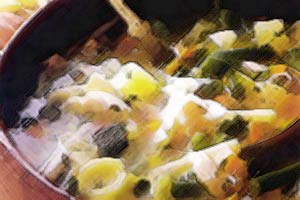 For the soup base:
For the soup base:
- 6 cups water
- 1 large potato, cut into bite sized chunks
- 2 carrots, peeled and chunked
- 1 large or 2 small onions, diced
- 2 leeks, white part only, sliced
- 1 bay leaf
- 1 sprig thyme
- 1 sprig Italian parsley
- 1 heaping tablespoon salt
Bring all the ingredients to a boil, turn the heat down, and simmer for about 30 minutes, covered.
For the soup:
- 2 cans white beans (navy, great northern, canellini) drained
and rinsed, or 3/4 cup dried beans prepared as follows:
In a pot, cover the dried beans with ample water, bring to a boil, boil for two minutes, and remove from heat. Allow the beans to soak for at least 1 hour. After 1 hour, drain, rinse, and put the beans back in the pot with fresh water to cover by at least two inches, add a crushed clove of garlic, a pinch of salt, bring to the boil, and simmer for about 30 minutes. Drain and rinse.
- 1 cup zucchini (or mixed summer squash), diced
- 1 cup or more fresh green beans, trimmed and cut into 1 inch lengths
- 4+ oz broken spaghetti or linguini (approx 1 inch lengths) or 1/2 cup orzo pasta
- Optional vegetables:
3/4 cup diced swiss chard stalks
1/2 cup diced bell peppers
3/4 peeled and diced tomatoes
After the soup base has simmered for at least
30 minutes, add the zucchini
and any of the optional vegetables.
If using dried
(rather
than canned)
beans, add them now as
well. Simmer for 15 minutes
Add the green beans , the pasta, and the canned beans. Simmer until the pasta is just al dente (10-15 minutes). Remove from heat. If not serving hot, allow to cool.
 For the pesto:
For the pesto:
- 1 large bunch fresh basil, leaves only (about 1 1/2 cups, tightly packed)
- 3 tbsp pine nuts
- 1/4 cup+ Extra virgin olive oil
- 2 large or 3-4 small cloves garlic, pressed.
- Pinch salt
- 1/2 cup+ grated parmesan cheese (grated as soon as possible before using)
In a food processor, combine the basil leaves, the pine nuts, and about half the olive oil. Process to a coarse paste. Remove to a mixing bowl, and add the garlic. Stir in the grated cheese, and add olive oil to desired consistency. When serving the soup, swirl in one heaping teaspoon of pesto into each bowl, and have more pesto out on the table. Serves 4-6
Just for Fun:
Quotable Quotes
“Are leaders born or made, and if they’re made can we return them under warranty?”— Scott Adams
“Keep away from people who try to belittle your ambitions. Small people always do that, but the really great make you feel that you, too, can become great.”—Mark Twain
Leadership? Management?
A young manager is working late one evening. As he comes out of his office, he sees the big boss standing by the shredder with a piece of paper in his hand. “Do you know how to work this thing?” the big boss asks. “Sure,” the young manager replies, eager to please. He feeds the paper into the shredder. “Now,” says the big boss, “I need two copies.”Copyright © 2003 Barnes & Conti Associates, Inc. ALL RIGHTS RESERVED.
Please send feedback to newsltr1
at barnesconti.com
Barnes & Conti, 940 Dwight Way Suite 15, Berkeley, CA 94710, USA
Copyright © 2004 Barnes & Conti Associates, Inc. ALL RIGHTS
RESERVED.
Barnes & Conti is a spam-free zone. We do not sell, trade, or give email addresses to anyone.
